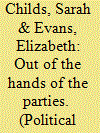| Srl | Item |
| 1 |
ID:
118228


|
|
|
|
|
| Publication |
2012.
|
| Summary/Abstract |
At the next general election the percentage of women elected to the smaller House of Commons risks being lower than in the current parliament, where they constitute 22 percent of all MPs. The 2008-10 Speaker's Conference identified many of the barriers faced by women and other under-represented groups and made a series of recommendations, only some of which have been introduced. The Government favours a voluntary approach to Recommendation 24, which calls for diversity data monitoring, whilst Recommendation 25 which calls for serious consideration of legislative quotas in the absence of a significant increase in the numbers of women in 2010, appears forgotten. A second Speaker's Conference should therefore be established; the issue of women's under-representation should be taken up above the party level-with legislative quotas introduced to address the system level failure of democratic representation at Westminster.
|
|
|
|
|
|
|
|
|
|
|
|
|
|
|
|
| 2 |
ID:
147520


|
|
|
|
|
| Summary/Abstract |
In January 2016, a debate was held on UK space policy in the House of Commons, timed to coincide with the extravehicular activity (EVA) undertaken by British astronaut Major Tim Peake as part of his mission to the International Space Station (ISS). UK participation in ISS activities marked the culmination of a significant reorientation of government space policy in recent years, and analysis of the parliamentary debate facilitates insight into the nature of that reorientation, and the policy goals that lay at its heart. It also delineates three key themes which underpinned the parliamentary debate: the novelty of space policy as a topic of political discussion in parliament; the use of the parliamentary arena as a means through which MPs champion their constituencies as prime locations for valuable economic benefits associated with the space sector; and the portrayal of space as a source of inspiration and driver of aspiration, and as an opportunity for a vigorous space industry policy. The paper argues for the utility of parliamentary analysis as a way to enrich our understanding of the evolution of contemporary UK space policy.
|
|
|
|
|
|
|
|
|
|
|
|
|
|
|
|